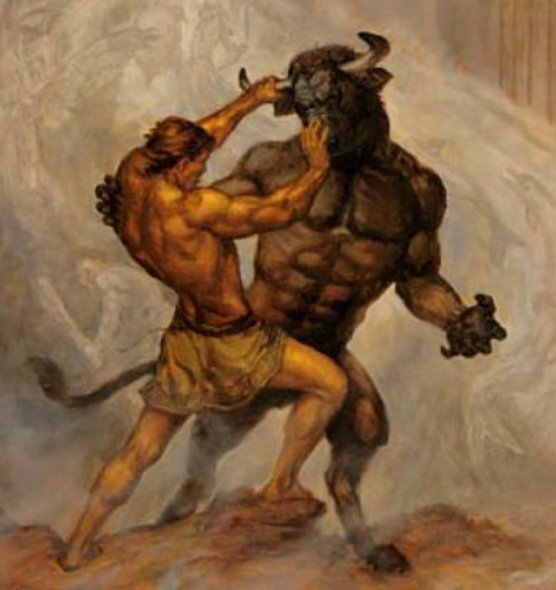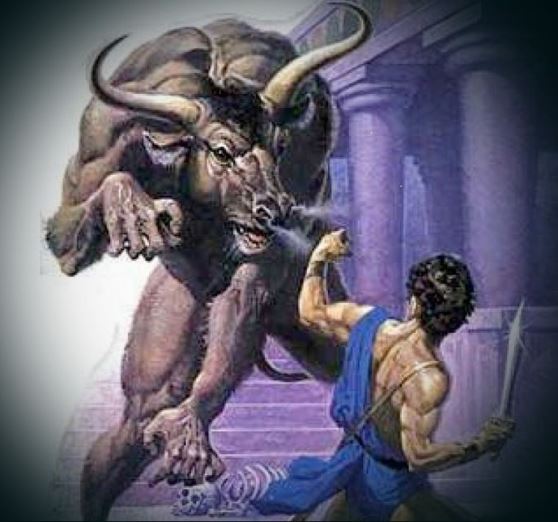Theseus greatest Athenian hero

The son of either Poseidon or Aegeus and Aethra, Theseus was widely considered the greatest Athenian hero, the king who managed to politically unify Attica under the aegis of Athens. Son of either Aegeus, the king of Athens, or Poseidon, the god of the sea, and Aethra, a princess, Theseus was raised by his mother in the palaces of Troezen. Upon reaching adulthood and finding out the identity of his father, he set out on a journey to Athens, during which he managed to outwit and overpower few notorious brigands: Periphetes, Sinis, Phaea, Sciron, Cercyon, and Procrustes. In Athens, after thwarting Medea’s attempts to eliminate him and capturing the Marathonian Bull, he volunteered to be one of the fourteen young Athenians sent to Crete as a sacrifice to the Minotaur so as to be able to kill the monster inside his Labyrinth. With the help of Ariadne who gave him a ball of thread to navigate himself inside the maze, Theseus managed to find and slay the Minotaur, after which he set sail back to Athens. There he ruled admirably for many years before an unsuccessful attempt (taken with his friend Pirithous) to abduct Persephone from the Underworld resulted in his deposition and, consequently, treacherous murder by Lycomedes of Scyros.
Theseus in Troezen: Foreshadowings of a Hero
The night Theseus was conceived, his mother Aethra slept with Aegeus, the king of Athens, and Poseidon, the god of the sea. Whoever his father had been, Theseus’ exceptional parentage was evident even in his early years. Soon after Theseus reached adulthood, Aethra sent him to Athens.
The Story of Theseus’ Birth
Even after two wives – Meta and Chalciope – Aegeus, the esteemed king of Athens, was still childless. Fearing the intentions of his three brothers, he headed off to Pythia to learn from the Oracle if he will ever produce a male heir. As always, the advice was all but straightforward: “The bulging mouth of the wineskin, o best of men, loose not until thou hast reached the height of Athens.” Aegeus didn’t understand any of this and sorrowfully set out on a journey back home. On his way to Athens, however, he did make one stop: calling at Troezen, he didn’t miss the chance to ask its king Pittheus if he would help him decipher the Oracle’s ambiguous reply. Pittheus, wise as he famously was, understood it perfectly, but chose to use the knowledge to his benefit: wishing for a nephew with Aegeus’ blood, he got his guest drunk and then introduced him to his daughter Aethra; Aegeus slept with her, a few hours before Poseidon, the mighty god of the sea, did the same. Nine months later, Aethra gave birth to a beautiful child: Theseus.
Heracles’ Lion Skin
Whether the son of a god or an exceptional mortal, Theseus was discernibly unlike his peers even as a child, outshining them in every category. One time, when Heracles visited Pittheus’ kingdom and took off his lion-skin before sitting at the dinner table, the children of the palace, mistaking it for a real lion, all fled in fear and alarm. Theseus calmly took an ax and attacked the skin; even back then, watching the scene with eyes full of love and awe, Aethra already knew what she was supposed to do in few years’ time.

The Sword and the Sandals
Because, you see, before Aegeus left Troezen, he hid his sword and a pair of sandals under a great rock. “If you bore a son in nine months,” he told Aethra, “and if he is able to lift this rock once he reaches manhood – then send him to Athens with this sword and these sandals, for then I’d know that he is, indeed, my son, the future king of Athens.” When the time came, Aethra led Theseus to the rock and relayed to him his father’s message. Theseus lifted the rock with ease and, equipped with Theseus’ tokens of paternity, hit the road to Athens.
The Death of Theseus
Once freed from the Underworld, Theseus hurried back to Athens only to find out that the city now had a new ruler: Menestheus. He fled right away for refuge to Lycomedes, the king of the island of Scyros. A tragic mistake, since Lycomedes was a supporter of Menestheus! After a few days of feigned hospitality, Lycomedes took the unsuspecting Theseus on a tour of the island; the second they reached its highest cliff, he violently pushed Theseus to his death.